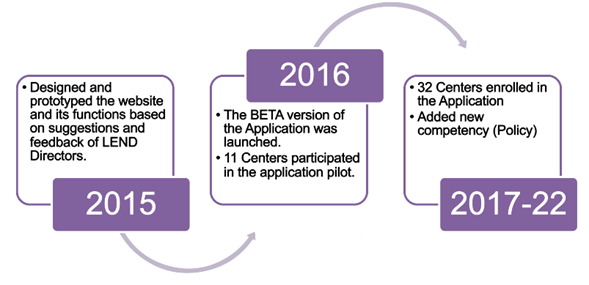About LPQI
Goal: The purpose of the LEND Program Quality Improvement (LPQI) Network is to help LEND programs improve the quality of their training. The LPQI Network:
- Uses standard measurement tools to measure progress.
- Uses a database created by AUCD that is available to all participating LEND programs.
- Gives feedback to programs to use for quality improvement, and
- Identifies programs that show changes consistent with "best practices."
Need: Leadership Education in Neurodevelopmental and Related Disabilities (LEND) programs test the effectiveness using data to determine specific training efforts, such as measuring trainee progress in the core competencies (for example, interprofessional teaming (teamwork) or leadership skills). But there is no easy way to measure short-term program effectiveness except by documenting trainee improvement within a LEND program.
Although each LEND program can show improvements in trainee outcomes, some training methods may be more effective than others. Since the data collected through the National Information Reporting System (NIRS) tracks long-term trainee outcomes, a need arose to track the effectiveness of specific training practices. The LPQI Network allows LEND programs to compare the quality of their program training to national averages and check the effectiveness of training content.
History: The LPQI Network was started in 2013 by LEND Directors who wanted to use the AUCD network to improve their training programs. In 2014, LEND programs discussed which tools to use, how to create a national database, and the rules for transparency and data-sharing. In 2015 and 2016, four LEND programs created a trainee self-report measure called the Core Competency Measure (CCM). They also created a second tool called the Interdisciplinary and Family-Centered Care Observation Rubric (I-FOR). The first pilot showed that CCM measures worked well for trainees and that IFOR measures worked well for faculty. The second pilot was a formal research study that lasted one year and focused on the usefulness and metrics of each tool. Currently, an analysis of 80 trainee/faculty data points is underway.
 The LPQI Advisory Group, which includes more than 20 LEND leaders, provided feedback at all stages of the LPQI Network creation. The LPQI pilot leaders shared updates at LEND director's meetings and with leaders at MCHB starting in 2014. Staff at AUCD designed the online application. LEND training directors and administrations provided input and tested it. AUCD launched the LPQI application in 2016. The LPQI application was then linked to NIRS. The goal of the LPQI Network is that all LEND programs will join LPQI in the future.
The LPQI Advisory Group, which includes more than 20 LEND leaders, provided feedback at all stages of the LPQI Network creation. The LPQI pilot leaders shared updates at LEND director's meetings and with leaders at MCHB starting in 2014. Staff at AUCD designed the online application. LEND training directors and administrations provided input and tested it. AUCD launched the LPQI application in 2016. The LPQI application was then linked to NIRS. The goal of the LPQI Network is that all LEND programs will join LPQI in the future.
Contact Information
For General TA Support
Contact [email protected]
For Technical Support
Contact Oksana Klimova
LQPI Chairperson: Jennifer Smith, PsyD
Interested in LPQI?
All LEND programs are welcome to participate in meetings, which are generally 30 minutes in length. Meetings are an opportunity for collaboration with other LPQI members who are also using LPQI.
To begin using the LPQI application or for any questions, please message [email protected]. In your email, please include an administrator who will manage LPQI.
Benefits of LPQI
LPQI is a voluntary process that helps LEND programs show the effectiveness of LEND training. There are several benefits to participating in LPQI:
- It improves LEND training and allows programs to measure trainee outcomes compared to national benchmarks.
- LPQI assists in faculty development. I-FOR measures help all faculty better understand the core concepts or goals of LEND training.
- It clarifies trainee learning expectations by sharing I-FOR measures with trainees, so that it is clear what they are supposed to learn.
- It answers the question "Are LEND trainees meeting LEND Core Competencies in Family-Professional Partnerships, Interdisciplinary/Interprofessional Teaming, and Policy/Leadership?"
- It ensures that clinics/research/policy efforts are consistent with LEND core competencies.
- LPQI meetings are an opportunity to collaborate with other LEND programs.